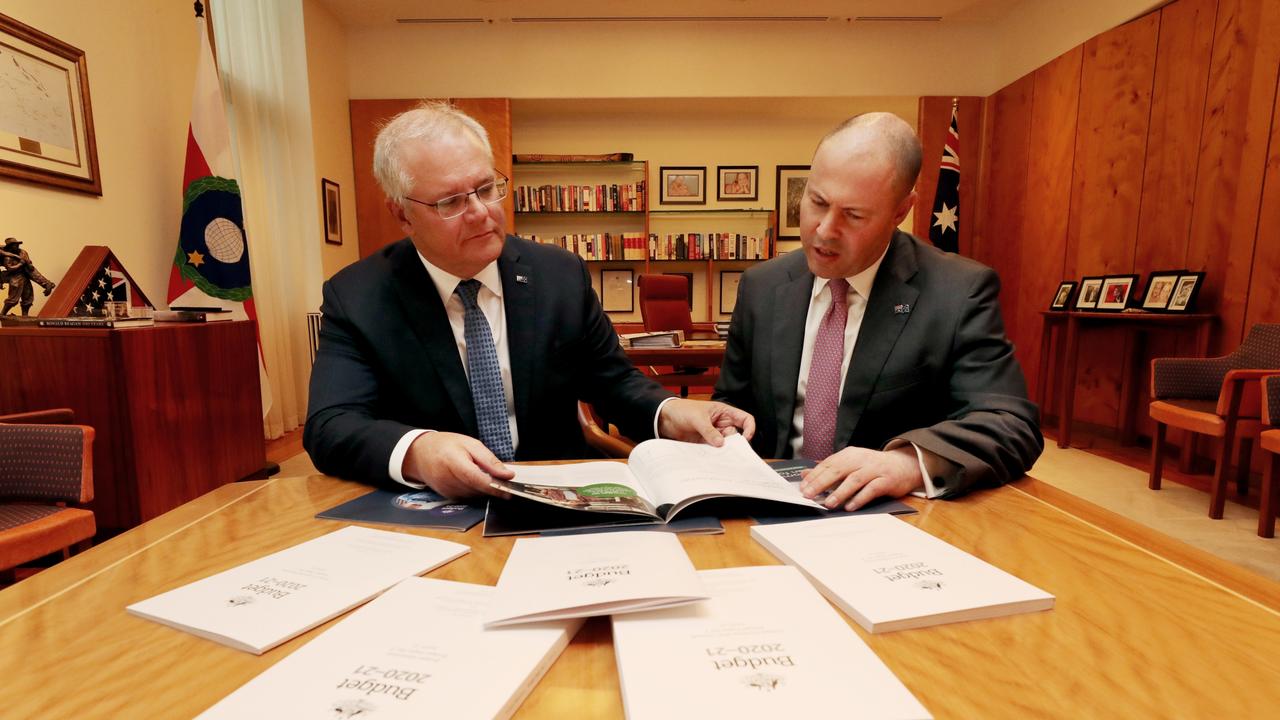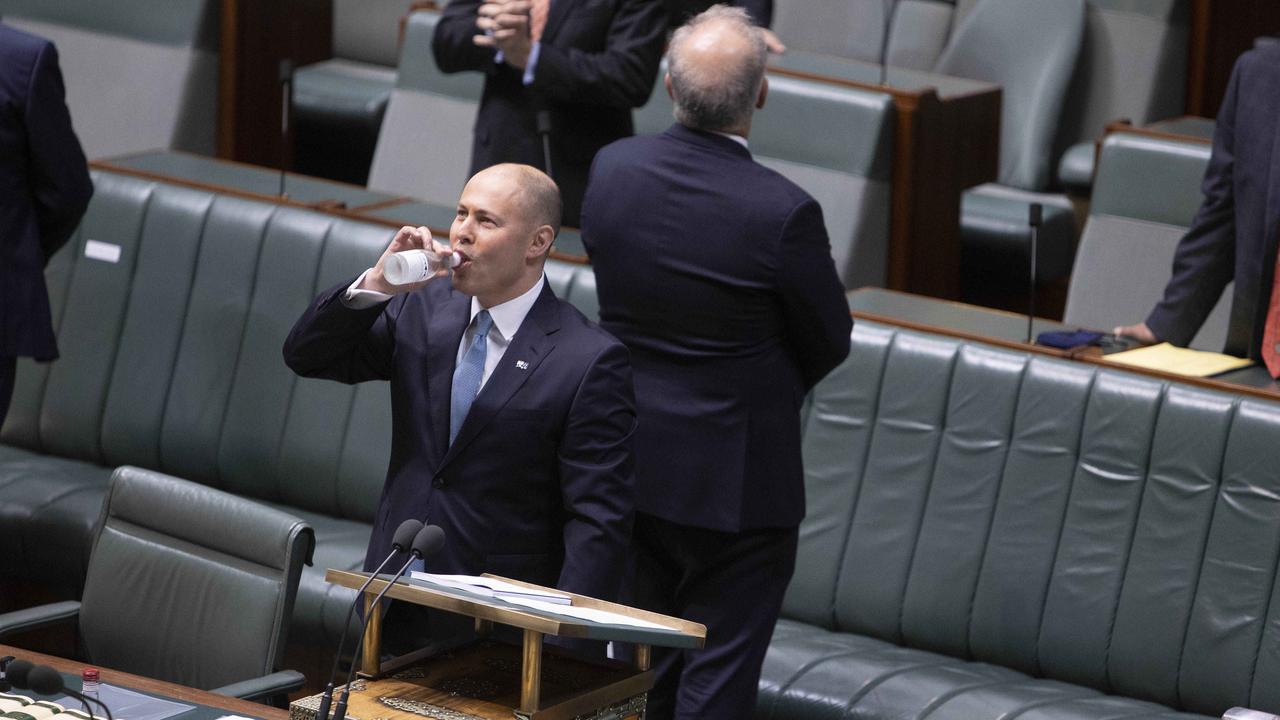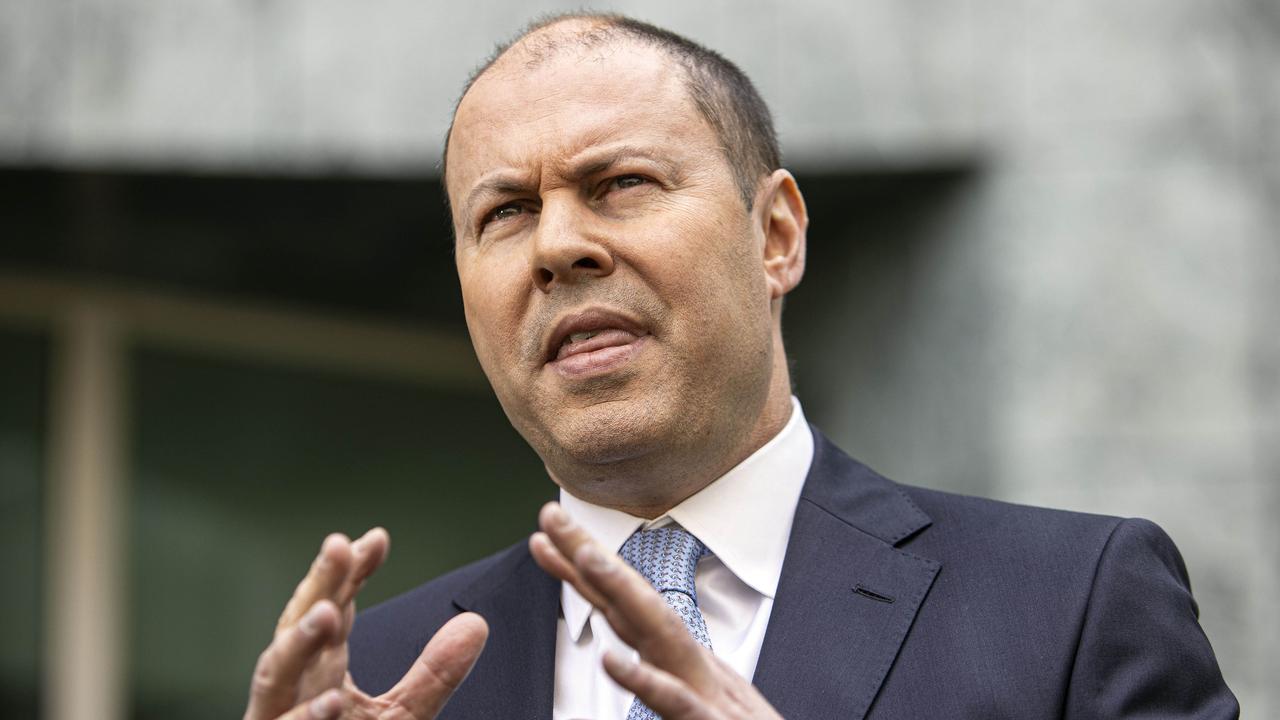Federal budget 2020 cheat sheet: Everything revealed in Frydenberg’s speech
More than 11 million Australians will get tax cuts as part of the Budget, with the money to be in pay packets by the end of the month.

Treasurer Josh Frydenberg has unveiled tax cuts worth up to $5490-a-year for families and will demand Parliament urgently legislate the relief to ensure the cash can hit workers’ pay packets by the end of the month, in a big spending federal Budget.
Promising the ‘instant’ tax cuts will offer hope in a year marked by “floods, droughts, fires, and a global pandemic”, the Budget will also offer a new wage subsidy to bosses who hire young, unemployed workers.
Pensioners will also secure a cash bonus worth a total of $500 in two lump sums in December and March.
Unveiling a monster Budget deficit of $213 billion this year and a record net debt of $966 billion by 2024, the fiscal outlook is based on a gamble that a vaccine for COVID-19 can be developed.
But there’s a sting in the tax tail for most workers earning $90,000-a-year or less who will secure half their tax cut now in their pay packet and another $1080 when they lodge their tax returns in July 2021.
That means for the vast majority of workers, the tax cuts are worth $20-a-week now in your pocket despite the fact they are worth $2160 over the financial year.
The reason for the delay is the result of the low and middle income tax offset that is only paid as a lump sum at the end of the financial year to workers earning less than $90,000.
RELATED: How much you’ll get back in tax cuts
RELATED: Budget’s winners and losers revealed

For high income earners on salaries of $120,000 a year or more the tax cut will be worth around $50 a week. They won’t have to wait for half of their tax cut when they lodge their return.
A lump-sum payment will also be offered to all workers to cover the backdated tax cut they have missed out on between July 1, 2020 and whenever the legislation passes Parliament. That’s likely to push the $1080 tax refund for most workers by around $300.
“Putting more money into the pockets of hard working Australians strengthened our economy to respond to this economic crisis,” Mr Frydenberg said.
“Tonight we go further again. More than 11 million taxpayers will get a tax cut backdated to 1 July this year. Australians will have more of their own money to spend on what matters to them, generating billions of dollars of economic activity and creating 50,000 new jobs.”
Describing Australia’s circumstances as “challenging” amid the most severe global economic crisis since the Great Depression, Mr Frydenberg said the economy and Australians were fighting back.
“Flood, drought, fires, and a global pandemic,’’ Mr Frydenberg said.
“So many Australians, through no fault of their own, are doing it tough. Lives have been lost. Businesses have closed. Jobs have gone.
“The Great Depression and two World Wars did not bring Australia to its knees, neither will COVID-19.”
But the cost of the COVID-19 recession will also deliver the biggest budget deficit in Australian history, reaching $213.7 billion this year. The budget forecasts the deficit to fall to $66.9 billion by 2023-24.
“Our economy has been hit, and hit hard,’’ Mr Frydenberg said.
“In the space of just one month, more than one million Australians lost their jobs or saw their working hours reduced to zero. In my home state of Victoria, millions have been in lockdown.
“Net debt will increase to $703 billion or 36 per cent of GDP this year and peak at $966 billion or 44 per cent of GDP in June 2024.
“This is a heavy burden, but a necessary one to responsibly deal with the greatest challenge of our time.”

Finance Minister Mathias Cormann, who is retiring from politics at the end of the year, said the Morrison Government had “no alternative” other than to borrow to help fund programs including JobKeeper, JobSeeker and the new wage subsidy for new workers.
“There was no alternative. That is why we have taken on the debt, with our eyes wide open.”
Effectively replacing JobKeeper which ends in March, the new wage subsidy to be known as JobMaker will reward companies creating new jobs for unemployed workers aged 16 to 34 with a wage subsidy worth up to $200-a-week.
“The JobMaker hiring credit will be payable for up to twelve months and immediately available to employers who hire those on JobSeeker aged 16-35,’’ Mr Frydenberg said.
“It will be paid at the rate of $200 per week for those aged under 30, and $100 per week for those aged between 30-35. New hires must work for at least 20 hours a week.”
All businesses, other than the major banks, will be eligible.
For businesses, the Instant Asset Write Off will be expanded delivering what the Treasurer described as the largest set of investment incentives any Australian Government has ever provided.
“From tonight, over 99 per cent of businesses will be able to write off the full value of any eligible asset they purchase for their business,’’ he said.
“This will be available for small, medium and larger businesses with a turnover of up to $5 billion until June 2022. It is a game changer. It will unlock investment.
“It will dramatically expand the productive capacity of the nation and create tens of thousands of jobs.
“A trucking company will be able to upgrade its fleet, a farmer will be able to purchase a new harvester and a food manufacturing business will be able to expand its production line.”

As previously announced, the Federal Budget will also help 10,000 first home buyers to purchase a new home sooner under our First Home Loan Deposit Scheme and offer more help for Australians struggling with anxiety and depression.
“My heart goes out to all those Australians – young and old – for whom COVID-19 has caused such pain,’’ Mr Frydenberg said.
“Tonight we are doubling the number of Medicare funded psychological services through the Better Access Initiative, from 10 to 20. My message tonight is that this House stands with you. You are not alone.”
Mr Frydenberg said there was no doubt the global economic environment remained uncertain with the impact of this crisis to be felt for many years to come.
“In Australia, the economy is forecast to fall by 3.75 per cent this calendar year and unemployment to peak at 8 per cent in the December quarter,” he said.
“Next calendar year, the economy is forecast to grow by 4.25 per cent, and unemployment to fall to 6.5 per cent by the June Quarter 2022.
“Once the recovery has taken hold and the unemployment rate is on a clear path back to pre-crisis levels, comfortably below 6 per cent, we will move to the second phase where there is a deliberate shift from providing temporary and targeted support to stabilising gross and net debt as a share of the economy.
“We will then rebuild our fiscal buffers, so that we can be prepared for the next economic shock.”




